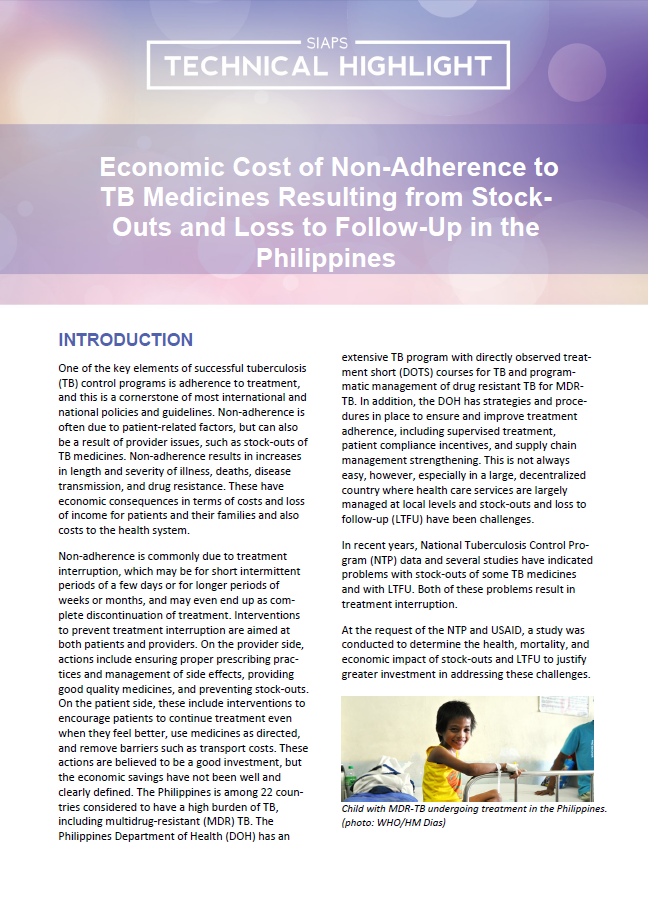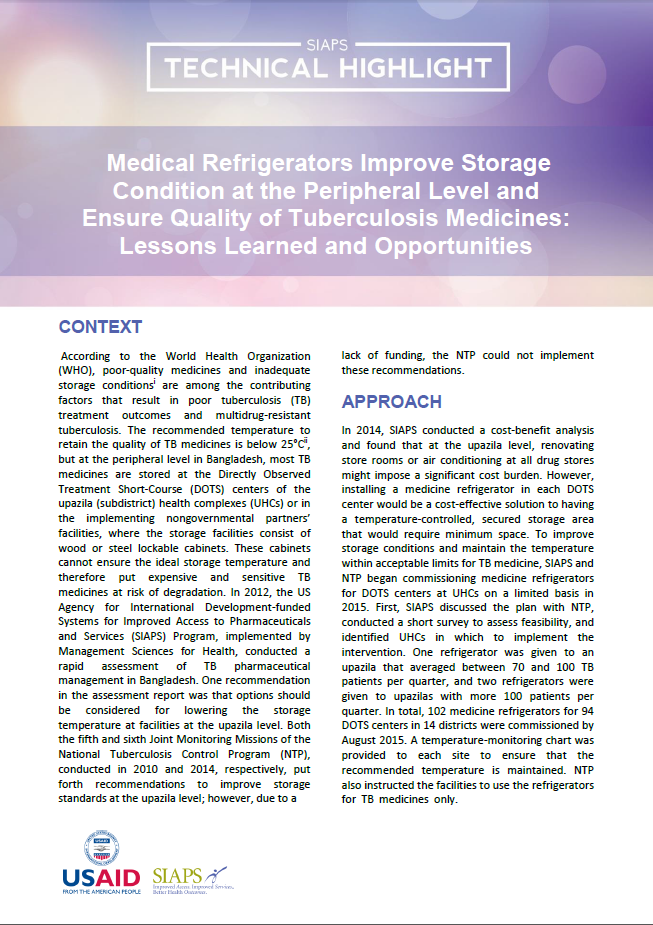New medicines and regimens, such as bedaquiline, delamanid, and the newly approved short course regimen, are an exciting development given that first- and second-line TB medicines have limited efficacy and potentially serious adverse effects. With the introduction of new TB medicines and regimens, some countries may target only the minimum WHO-recommended conditions (i.e., proper patient … Read more
Archive TB
Focus on Priority and Emerging Health Issues
Comprehensive strategies and actions for monitoring the safety of medicines are essential to a well-functioning pharmaceutical sector. The links below highlight recent SIAPS Program work in priority and emerging health issues to strengthen health systems. SIAPS Voices series “You can’t achieve UHC without thinking about gender” In public health, when you’re designing an intervention you’re … Read more
Economic Cost of Non-Adherence to TB Medicines Resulting from Stock-Outs and Loss to Follow-Up in the Philippines

One of the key elements of successful tuberculosis (TB) control programs is adherence to treatment, and this is a cornerstone of most international and national policies and guidelines. Non-adherence is often due to patient-related factors, but can also be a result of provider issues, such as stock-outs of TB medicines. Non-adherence results in increases in … Read more
Medical Refrigerators Improve Storage Condition at the Peripheral Level and Ensure Quality of Tuberculosis Medicines: Lessons Learned and Opportunities

According to the World Health Organization (WHO), poor-quality medicines and inadequate storage conditions are among the contributing factors that result in poor tuberculosis (TB) treatment outcomes and multidrug-resistant tuberculosis. The recommended temperature to retain the quality of TB medicines is below 25°C, but at the peripheral level in Bangladesh, most TB medicines are stored at … Read more
Bedaquiline Treatment Reaches 200 Patients in Georgia
Georgia is one of the first countries to benefit from the USAID‑Janssen Therapeutics bedaquiline (BDQ) donation program. Along with delamanid, BDQ is one of only two new TB medicines released to the market in over 40 years. These medicines are being used for the treatment of MDR-TB patients, as well as TB patients who have … Read more
World TB Day 2016: Celebrating Successes and Lessons Learned in Swaziland
In 2012, bedaquiline was conditionally approved by the U.S. Food and Drug Administration for the treatment of drug-resistant tuberculosis (TB), making it the first new TB drug to enter the market in more than 40 years. With the rise of multidrug-resistant and extensively drug-resistant TB leaving patients with fewer treatment options, the approval of bedaquiline … Read more
New hope for treating drug-resistant TB in Swaziland: An interview with Khontile Kunene
In April 2015, USAID and Janssen Therapeutics officially launched the bedaquiline (BDQ) donation initiative, under which Janssen committed to providing free BDQ to 30,000 patients with multidrug-resistant tuberculosis (MDR-TB) over a four-year period. Along with delamanid, BDQ is one of only two new TB medicines released to the market in over 40 years. These medicines … Read more
Expanding options for TB patients in Georgia: An interview with Maya Kavtaradze
In April 2015, USAID and Janssen Therapeutics officially launched the bedaquiline (BDQ) donation initiative, under which Janssen committed to providing free BDQ to 30,000 patients with multidrug-resistant tuberculosis (MDR-TB) over a four-year period. Along with delamanid, BDQ is one of only two new TB medicines released to the market in over 40 years. These medicines … Read more
SIAPS Showcases Its Work at the 15th Annual Global Health Mini-U
On March 4, SIAPS Program technical staff presented at the 15th Global Health Mini-University, a one-day learning forum for professionals and students in the field of global health. Hosted by USAID, the George Washington University Milken Institute School of Public Health, and the Global Health Professional and Organizational Development Program, the event featured more than … Read more
Supporting the National Action Plan on MDR-TB
Global partnerships and new models of TB care are crucial to success in the fight against multidrug-resistant tuberculosis (MDR-TB), according to speakers at a panel discussion on the White House National Action Plan for Combating MDR-TB. The plan, which was released in December, aims to treat 35% of all MDR-TB patients in the 10 countries with the highest TB burden … Read more


